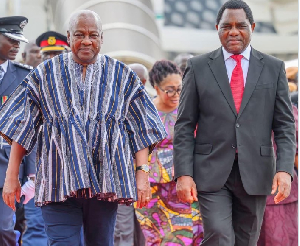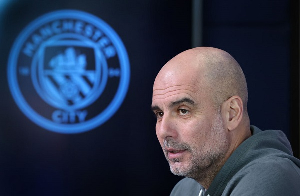Ghana earned $1.97 billion from the export of crude oil from January to September 2011.
However, crude oil imports for the same period amounted to $991.4 million while import of oil products hit $1.1 billion. Additionally, import of gas, under the West Africa Gas Pipeline project, amounted to $107.9 million.
However, the country’s total debt stock increased from GH¢17.5 billion or 37.8 per cent of Gross Domestic Product (GDP) in December 2010 to GH¢22.2 billion at the end of September 2011, representing about 41.7 per cent of GDP.
The domestic component was GH¢11.4 billion while the external portion was GH¢10.8 billion or $7.1 billion.
The rising debt level of the country has been described by many economists and market watchers as worrying.
Highlighting the outlook of the economy at a press conference yesterday, Paa Kwesi Amissah Arthur, Governor of the Bank of Ghana, (BoG), said the conditions in the global economy remained uncertain with implications for financial markets and commodity prices.
Conditions for the external trade sector, he said, remained generally favorable, supported by significant export growth.
Indications are that the growth potential in the economy would remain strong despite the downward adjustment of projected GDP to 13.6 percent from 14.4 percent in 2011, the report stated.
Developments in the Bank of Ghana’s Composite Index of Economic Activity showed that the pace of economic activity was firm going into the last quarter of the year.
On government’s fiscal operations, total expenditure hit GH¢8.7 billion, representing an increase of 37.1 percent over the corresponding period of 2010. The bulk of the expenditures were in respect of personal emoluments of GH¢3.3 billion and Ministries Departments and Agencies (MDAs) spending of GH¢1.8 billion.
Interest rates declined consistently between January and July 2011. But in the months of August and September 2011 rates remained broadly stable, especially at the short end of the market.
The 91-day Treasury bill rates declined from 12.2 percent in January 2011 to 9.4 percent in September 2011.
Gross International Reserves of the Central Bank at the end of September 2011 was estimated at $4.6 billion, equivalent to 3.5 months of import cover.
…….Policy Rate Maintained
Meanwhile, the Central Bank maintained its policy rate-the rate at which it lends to banks at 12.5 percent for the third conservative time.
This means that lending rate, which is hovering at average of 27 percent, will not change for the rest of the year.
The Monetary Policy Committee (MPC) considered wage pressures, payment arrears and recent depreciation of the exchange rate, which increased upside risks to inflation.
Before the meeting, analysts anticipated the same policy rate.
Earlier, Razia Khan, Head of Research, Standard Chartered Bank Africa told BUINESS GUIDE that the Bank of Ghana (BoG) would keep the policy rate at the same level.
“Although with the Ghana Cedi traditionally weakening in the run-up to Christmas and inflation likely to turn, the Central Bank may need to tighten rates in the New Year,” she explained.
However, the Central Bank’s inflation forecast indicated that the end of year target was attainable.
The MPC revealed that it will continue to monitor emerging risks and implement appropriate measures to counter any adverse effects on macroeconomic stability.
Business News of Thursday, 20 October 2011
Source: Charles Nixon Yeboah













